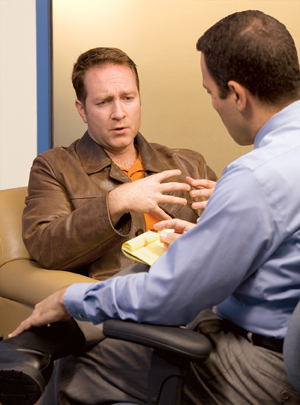Treating Anxiety Disorders with Therapy
Treating Anxiety Disorders with Therapy
If you have an anxiety disorder, you don’t have to suffer anymore. Treatment is available. Therapy (also called counseling) is often a helpful treatment for anxiety disorders. With therapy, a specially trained professional (therapist) helps you face and learn to manage your anxiety. Therapy can be short-term or long-term depending on your needs. In some cases, medicine may also be prescribed with therapy. It may take time before you notice how much therapy is helping, but stick with it. With therapy, you can feel better.
Cognitive behavioral therapy (CBT)
Cognitive behavioral therapy (CBT) teaches you to manage anxiety. It does this by helping you understand how you think and act when you’re anxious. Research has shown CBT to be a very effective treatment for anxiety disorders. How CBT is run is almost like a class. It involves homework and activities to build skills that teach you to cope with anxiety step by step. It can be done in a group or one-on-one, and often takes place for a set number of sessions. CBT has two main parts:
Cognitive therapy helps you identify the negative, irrational thoughts that occur with your anxiety. You’ll learn to replace these with more positive, realistic thoughts.
Behavioral therapy helps you change how you react to anxiety. You’ll learn coping skills and methods for relaxing to help you better deal with anxiety.
Other forms of therapy
Other therapy methods may work better for you than CBT. Or, you may move from CBT to another form of therapy as your treatment needs change. This may mean meeting with a therapist by yourself or in a group. Therapy can also help you work through problems in your life, such as drug or alcohol dependence, that may be making your anxiety worse.
Getting better takes time
Therapy will help you feel better and teach you skills to help manage anxiety long term. But change doesn’t happen right away. It takes a commitment from you. And treatment only works if you learn to face the causes of your anxiety. So, you might feel worse before you feel better. This can sometimes make it hard to stick with it. But remember: Therapy is a very effective treatment. The results will be well worth it.
Helping yourself
If anxiety is wearing you down, here are some things you can do to cope:
Check with your doctor and rule out any physical problems that may be causing the anxiety symptoms.
If an anxiety disorder is diagnosed, seek mental healthcare. This is an illness and it can respond to treatment. Most types of anxiety disorders will respond to talk therapy and medicine.
Educate yourself about anxiety disorders. Keep track of helpful online resources and books you can use during stressful periods.
Try stress management techniques such as meditation.
Consider online or in-person support groups.
Don’t fight your feelings. Anxiety feeds itself. The more you worry about it, the worse it gets. Instead, try to identify what might have triggered your anxiety. Then try to put this threat in perspective.
Keep in mind that you can’t control everything about a situation. Change what you can and let the rest take its course.
Exercise — it’s a great way to relieve tension and help your body feel relaxed.
Examine your life for stress, and try to find ways to reduce it.
Avoid caffeine and nicotine, which can make anxiety symptoms worse.
Fight the temptation to turn to alcohol or unprescribed drugs for relief. They only make things worse in the long run.
Updated:
October 13, 2017
Sources:
Generalized anxiety disorder in adults: Epidemiology, pathogenesis, clinical manifestations, course, assessment, and diagnosis, Up To Date
Reviewed By:
Ballas, Paul, DO,Fraser, Marianne, MSN, RN,Image reviewed by StayWell art team.
